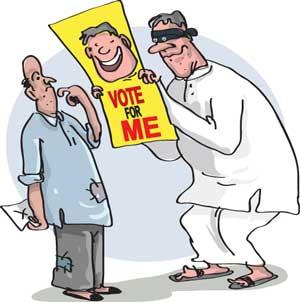Reply To:
Name - Reply Comment
 Some 100 years ago when the demands for the franchise in Sri Lanka was gaining ground slowly, the British rulers had reportedly attempted to reject it on the grounds that Sri Lankan masses then were not matured enough to use the franchise. Then it was perceived as an insult to the local people by the colonial rulers. However, Sri Lanka gained the universal suffrage through the Donoughmore Commission recommendations in 1931.
Some 100 years ago when the demands for the franchise in Sri Lanka was gaining ground slowly, the British rulers had reportedly attempted to reject it on the grounds that Sri Lankan masses then were not matured enough to use the franchise. Then it was perceived as an insult to the local people by the colonial rulers. However, Sri Lanka gained the universal suffrage through the Donoughmore Commission recommendations in 1931.
Going by the maturity that the voters have been showing in selecting political parties and candidates to cast their votes a century later, one could imagine the situation in early 20th century.
Tomorrow, the country goes to another election – an election to elect 225 law makers in the legislature – and almost all voters might have made up their minds whether to vote or not, depending on their enthusiasm or the coronavirus threat and frustration over the politics in the country. And those who are to vote would definitely have decided whom to vote by now, some considering mostly petty and personal issues while some others taking into account the wider issues such as development, corruption, national security and reconciliation.
Pieter Keuneman, the veteran leftist leader of yesteryear and the former leader of the Communist Party of Sri Lanka (CPSL) had once said that people in Sri Lanka were more inclined to ponder upon whom to defeat rather than whom to elect at elections. The situation might have changed for some extent now, but the essence of his observation seems to be still valid. Hence, majority of people vote for a party at elections – local or national level - without knowing what is the party going to do to the country or forgetting what it has done in the past.
And many regret what they have done, after a few months. From then on, as Keunemen said again they would want to defeat the party they voted into power few months ago. Hence, there was a time, before the second Republican Constitution was introduced in 1978 when people changed the regime at every successive election. The Proportional Representation (PR) system brought in along with that Constitution extended the duration of parties to be in power. Yet, the frustration in few months among the people after each election has been a norm for the past several decades.
Accordingly, a saying that all 225 in Parliament were robbers became popular in the recent past and interestingly not even those 225 Parliamentarians in the last Parliament seemed to have been offended by it. Contrarily, even they opted to quote the saying, but as an attempt to dissociate themselves from their other 224 colleagues. Ironically, majority of those 225 Parliamentarians have been given the opportunity to contest this time as well by their respective parties and the possibility of most of them returning is high.
It is very difficult to understand the voting patterns of the ordinary voters. The impact of professed policies and past activities of political parties on the voter could not be measured. When Chandrika Kumaratunga campaigned for a political solution to the ethnic problem even in the southern parts of the country, she was awarded a thumping victory with 62% of valid votes – the highest percentage any Presidential candidate has polled so far – at the 1994 Presidential election. However, almost the entire south stood against her within seven months when she really presented a proposal for the purpose.
JVP had polled only about 3% votes at the last Presidential election, despite the party having not been accused of any corruption or violence for the past thirty years – a great achievement compared to other parties. Movie and teledrama actresses who had proved their lack of knowledge in politics outshone senior politicians and candidates who had signed their nomination papers at the remand prison after being accused of crimes had topped the list of preferential votes at the subsequent elections in the past. People in the North voted for the politicians who eulogized the LTTE in their campaigns but defeated the former LTTE cadres who really took up arms.
The current CPSL leader D.E.W. Gunasekara recently presented an invaluable guideline for the voters to elect Parliamentarians. He said a member of the legislature must be a person who is capable in contributing to law making, policy making, monitoring of public financing and representation of people who elect them to the legislature. It is the duty of the voters to elect people with such qualities, whichever party they are to vote tomorrow.